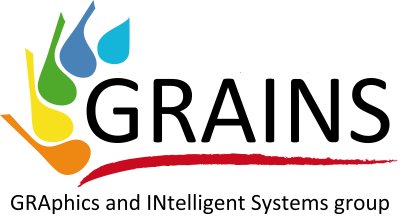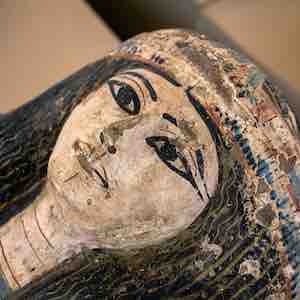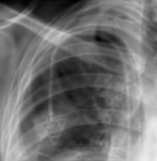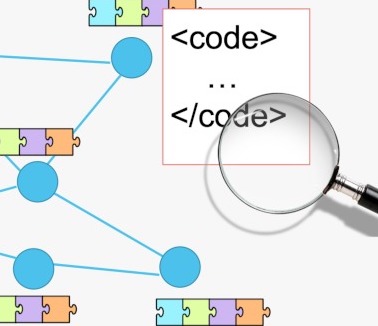Virtual, Augmented and Mixed Reality, Computer Graphics, and Human-Machine Interaction
-
- Thesis with an external company or research center
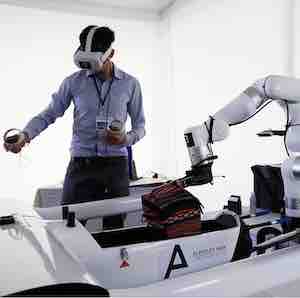 On-demand haptic feedback using collaborative robots for VR simulation of manual tasks in industrial processesHaptic feedback is an essential aspect of human-computer interaction, particularly in industrial settings where precise and realistic touch sensations are crucial for successful manual tasks. Collaborative robots (Cobots) have revolutionized industrial production processes by working alongside human operators, and this characteristic also opened up other uses for such devices, for example, in the context of Virtual Reality (VR). This thesis proposal aims to investigate the feasibility of providing faithful on-demand haptic feedback using collaborative robots as "Encountered Type" haptic devices, to simulate a manual task (i.e., defects identification and correction) within industrial production processes. The research will also explore how this technology can enhance defect identification, issue management, and improve workplace safety by simulating ergonomic aspects and delivering effective training content. The investigation will be conducted in collaboration with industrial partners and will align with the objectives of the MANAGE 5.0 project, supported by the Ministry of Enterprises and Made in Italy (MISE) and the National Recovery and Resilience Plan (PNRR).Haptic feedback is an essential aspect of human-computer interaction, particularly in industrial settings where precise and realistic touch sensations are crucial for successful manual tasks. Collaborative robots (Cobots) have revolutionized industrial production processes by working alongside human operators, and this characteristic also opened up other uses for such devices, for example, in the context of ...
On-demand haptic feedback using collaborative robots for VR simulation of manual tasks in industrial processesHaptic feedback is an essential aspect of human-computer interaction, particularly in industrial settings where precise and realistic touch sensations are crucial for successful manual tasks. Collaborative robots (Cobots) have revolutionized industrial production processes by working alongside human operators, and this characteristic also opened up other uses for such devices, for example, in the context of Virtual Reality (VR). This thesis proposal aims to investigate the feasibility of providing faithful on-demand haptic feedback using collaborative robots as "Encountered Type" haptic devices, to simulate a manual task (i.e., defects identification and correction) within industrial production processes. The research will also explore how this technology can enhance defect identification, issue management, and improve workplace safety by simulating ergonomic aspects and delivering effective training content. The investigation will be conducted in collaboration with industrial partners and will align with the objectives of the MANAGE 5.0 project, supported by the Ministry of Enterprises and Made in Italy (MISE) and the National Recovery and Resilience Plan (PNRR).Haptic feedback is an essential aspect of human-computer interaction, particularly in industrial settings where precise and realistic touch sensations are crucial for successful manual tasks. Collaborative robots (Cobots) have revolutionized industrial production processes by working alongside human operators, and this characteristic also opened up other uses for such devices, for example, in the context of ... - Thesis with an external company or research center
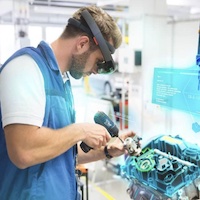 Mixed Reality for conveying defects information to production line operatorsIn modern production processes, the efficient detection and management of defects are critical for ensuring high-quality output and optimizing manufacturing operations. The advent of automation and advanced computer vision techniques has enabled the automatic detection of defects in real-time. However, conveying this vital information to production line operators in a clear, intuitive, and timely manner remains a challenge.
Mixed Reality for conveying defects information to production line operatorsIn modern production processes, the efficient detection and management of defects are critical for ensuring high-quality output and optimizing manufacturing operations. The advent of automation and advanced computer vision techniques has enabled the automatic detection of defects in real-time. However, conveying this vital information to production line operators in a clear, intuitive, and timely manner remains a challenge.
This thesis proposal aims to investigate the application of Mixed Reality (MR) as a means for conveying information regarding automatically detected defects to production line operators. The research will involve the integration of the output from computer vision algorithms and defect detection methodologies that have been already developed and experimented on a production line of Stellantis.
By utilizing MR technology, the proposed investigation seeks to overlay defect-related information, such as visual cues, guidance, and instructions, directly onto the physical production environment in real-time. This approach aims to enhance operators' situational awareness, enable rapid decision-making, and facilitate timely defect resolution.
The research collaboration will actively engage the industrial partner, ensuring the practicality and relevance of the findings. Moreover, the project will be in alignment with the overarching objectives of the MANAGE 5.0 project, funded by the Ministry of Enterprises and Made in Italy (MISE) and the National Recovery and Resilience Plan (PNRR).In modern production processes, the efficient detection and management of defects are critical for ensuring high-quality output and optimizing manufacturing operations. The advent of automation and advanced computer vision techniques has enabled the automatic detection of defects in real-time. However, conveying this vital information to production line operators in a clear, intuitive, and timely manner remains ... - Thesis with an external company or research center
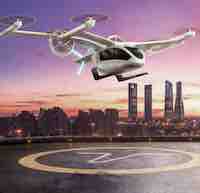 Advanced HMIs for reducing passenger anxiety in autonomous VTOL flights under stressful conditionsAs autonomous Vertical Take-Off and Landing (VTOL) technology advances, ensuring passenger comfort and confidence becomes paramount. Previous research has focused on developing Human-Machine Interfaces (HMIs) to improve passenger experience during standard flight phases (takeoff, cruise, landing) and in common visibility conditions. However, passengers are likely to experience anxiety in more critical situations, like presence of heavy air traffic, turbulent weather (wind gusts, snow, thunderstorms), and varying visibility (sunny, cloudy, foggy, snowy, stormy).
Advanced HMIs for reducing passenger anxiety in autonomous VTOL flights under stressful conditionsAs autonomous Vertical Take-Off and Landing (VTOL) technology advances, ensuring passenger comfort and confidence becomes paramount. Previous research has focused on developing Human-Machine Interfaces (HMIs) to improve passenger experience during standard flight phases (takeoff, cruise, landing) and in common visibility conditions. However, passengers are likely to experience anxiety in more critical situations, like presence of heavy air traffic, turbulent weather (wind gusts, snow, thunderstorms), and varying visibility (sunny, cloudy, foggy, snowy, stormy).
The objective of this thesis is to design and develop such HMIs by integrating them into an immersive VR-based autonomous VTOL simulator for urban mobility. In particular, the student will focus on the visualization of the air traffic, and on the integration of air traffic data using a proprietary API.
During the thesis, the student will be able to use the most advanced VR HMD with human-eye resolution (Varjo-XR 3) and a motion simulation platform available at the Department of Control and Computer Engineering (DAUIN). The student will also learn how to carry out user centred experimental design and validation.
The project is developed in the context of the Centro Nazionale per la Mobilità Sostenibile (CNMS-MOST) funded by the National Recovery and Resilience Plan (PNRR) which involves multiple Universities and Companies.As autonomous Vertical Take-Off and Landing (VTOL) technology advances, ensuring passenger comfort and confidence becomes paramount. Previous research has focused on developing Human-Machine Interfaces (HMIs) to improve passenger experience during standard flight phases (takeoff, cruise, landing) and in common visibility conditions. However, passengers are likely to experience anxiety in more critical ... - Thesis with an external company or research center
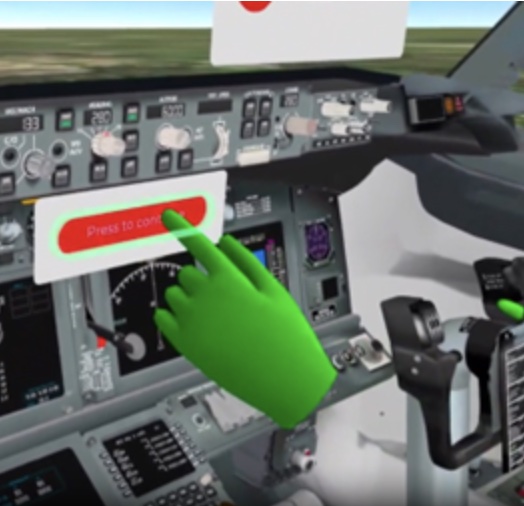 Multi-input techniques to improve interaction accuracy in cockpit simulation of advanced mobility vehiclesDespite the advancements in Virtual Reality (VR) technology, cost-effective hardware and tracking system are still suffering from accuracy limitations that in some cases can limit the natural interaction of the user with the virtual environment, ruining the user experience. That is the case, for instance, of operating on keyboards and button in an aircraft cockpit (precisely rotating small and tightly spaced knobs, pushing buttons, etc.) which are particularly challenging, especially when the user is also subject to external movements or acceleration (like in a flying helicopter or VTOL)
Multi-input techniques to improve interaction accuracy in cockpit simulation of advanced mobility vehiclesDespite the advancements in Virtual Reality (VR) technology, cost-effective hardware and tracking system are still suffering from accuracy limitations that in some cases can limit the natural interaction of the user with the virtual environment, ruining the user experience. That is the case, for instance, of operating on keyboards and button in an aircraft cockpit (precisely rotating small and tightly spaced knobs, pushing buttons, etc.) which are particularly challenging, especially when the user is also subject to external movements or acceleration (like in a flying helicopter or VTOL)
The objective of this thesis is to develop a human-machine interaction approach for this specific use case capable of overcoming the hardware limitation by combining multiple user inputs together (eye-tracking, finger tracking, speed of movements, etc.).
This thesis is aimed for students that are interested in conducting research on frontier aspects of the human-computer interaction in VR and apply it to a real-world use case.
During the thesis, the student will be able to use VR HMD with hand tracking and eye tracking technology and a motion simulation platform available at the Department of Control and Computer Engineering (DAUIN). The student will also learn how to carry out user centred experimental design and validation.
The project is developed in the context of the Centro Nazionale per la Mobilità Sostenibile (CNMS-MOST) funded by the National Recovery and Resilience Plan (PNRR) which involves multiple Universities and Companies.Despite the advancements in Virtual Reality (VR) technology, cost-effective hardware and tracking system are still suffering from accuracy limitations that in some cases can limit the natural interaction of the user with the virtual environment, ruining the user experience. That is the case, for instance, of operating on keyboards and button in an aircraft cockpit (precisely rotating small and tightly spaced ... - Thesis with an external company or research center
 A VR-based recommender system for educational material in the MetaverseSupervisors: Fabrizio LambertiFinding educational material that is required to complete the own set of possessed skills or those of a company's workforce is essential in today's knowledge society. The IEEE Digital Reality has developed a tool, known as Knowledge as a Service or KaaS (https://kaas.ieee.org/) that can be used to describe a set of possessed skills based on the IEEE ontology and match it against the knowledge base of IEEE Technology Navigator, thus gaining access to the universe of information related to IEEE conferences, publications, standards, and articles. The aim of this thesis is to create a virtual environment for letting users access the KaaS tool in an engaging manner. It will be necessary to choose whether to use one of the existing VR-enabled Metaverse or Social VR platforms, or develop an hoc one, e.g., starting from a custom virtual environment recently developed by the GRAINS group and the VR@POLITO for similar purposes. A pleasant and appropriate immersive space will have to be created. Then, the virtual environment will have to be connected to KaaS using available REST APIs, and an effective (e.g., gamified) user interface will have to be developed.Finding educational material that is required to complete the own set of possessed skills or those of a company's workforce is essential in today's knowledge society. The IEEE Digital Reality has developed a tool, known as Knowledge as a Service or KaaS (https://kaas.ieee.org/) that can be used to describe a set of possessed skills based on the IEEE ontology and match it against the knowledge base of IEEE ...
A VR-based recommender system for educational material in the MetaverseSupervisors: Fabrizio LambertiFinding educational material that is required to complete the own set of possessed skills or those of a company's workforce is essential in today's knowledge society. The IEEE Digital Reality has developed a tool, known as Knowledge as a Service or KaaS (https://kaas.ieee.org/) that can be used to describe a set of possessed skills based on the IEEE ontology and match it against the knowledge base of IEEE Technology Navigator, thus gaining access to the universe of information related to IEEE conferences, publications, standards, and articles. The aim of this thesis is to create a virtual environment for letting users access the KaaS tool in an engaging manner. It will be necessary to choose whether to use one of the existing VR-enabled Metaverse or Social VR platforms, or develop an hoc one, e.g., starting from a custom virtual environment recently developed by the GRAINS group and the VR@POLITO for similar purposes. A pleasant and appropriate immersive space will have to be created. Then, the virtual environment will have to be connected to KaaS using available REST APIs, and an effective (e.g., gamified) user interface will have to be developed.Finding educational material that is required to complete the own set of possessed skills or those of a company's workforce is essential in today's knowledge society. The IEEE Digital Reality has developed a tool, known as Knowledge as a Service or KaaS (https://kaas.ieee.org/) that can be used to describe a set of possessed skills based on the IEEE ontology and match it against the knowledge base of IEEE ... - Thesis with an external company or research center
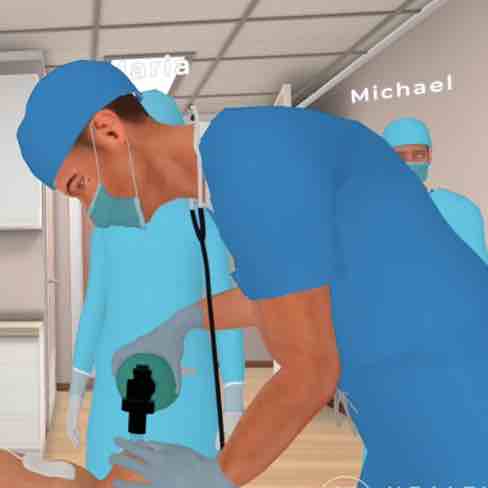 XR for training emergency medical personnel in invasive proceduresThis thesis will be developed in collaboration with Mauriziano Hospital / Università di Torino and will focus on the use of XR technologies in healthcare education and training. More specifically, in their clinical practice, emergency doctors often need to perform invasive procedures. Among these, one of the most complex is the placement of a central venous catheter in a large-caliber vein (jugular, subclavian, femoral). The procedure involves several steps, some of which are performed under ultrasound guidance. Specifically, the doctor must identify the vessel to be punctured using ultrasound and manage the ultrasound probe with one hand while using the dominant hand to puncture the vessel. Another procedure presenting similar challenges is thoracentesis, a medical procedure performed to remove fluid or air from the pleural space (i.e., the thin gap between the lungs and the chest wall). Similarly, paracentesis is a medical procedure in which a needle or catheter is inserted into the peritoneal cavity to obtain ascitic fluid for diagnostic or therapeutic purposes.
XR for training emergency medical personnel in invasive proceduresThis thesis will be developed in collaboration with Mauriziano Hospital / Università di Torino and will focus on the use of XR technologies in healthcare education and training. More specifically, in their clinical practice, emergency doctors often need to perform invasive procedures. Among these, one of the most complex is the placement of a central venous catheter in a large-caliber vein (jugular, subclavian, femoral). The procedure involves several steps, some of which are performed under ultrasound guidance. Specifically, the doctor must identify the vessel to be punctured using ultrasound and manage the ultrasound probe with one hand while using the dominant hand to puncture the vessel. Another procedure presenting similar challenges is thoracentesis, a medical procedure performed to remove fluid or air from the pleural space (i.e., the thin gap between the lungs and the chest wall). Similarly, paracentesis is a medical procedure in which a needle or catheter is inserted into the peritoneal cavity to obtain ascitic fluid for diagnostic or therapeutic purposes.
The main difficulty of these procedures is developing good manual skills in simultaneously handling multiple instruments. This thesis proposal aims to study XR solutions that would allow emergency doctors to practice and improve their manual skills. It would be beneficial to conduct training using XR, because, currently, the only way to learn is by performing these procedures live with real patients. This approach comes with a range of issues, including risk to the patient, overcrowding in the emergency department, and the lack of necessary time to properly apply and execute the training on the procedure. The literature has already confirmed the numerous benefits brought by the use of XR technologies for medical training. However, limited works have focused on aspects related to the improvements of manual skills. This is probably due to the challenges that come when integrating real tools within Augmented or Virtual Reality applications.
Suggested reads:
- Vaghela, K. R., et al. Active vs passive haptic feedback technology in virtual reality arthroscopy simulation: Which is most realistic? Journal of Clinical Orthopaedics and Trauma (2021)
- Licona, A. R., et al. Applications of haptics in medicine. Haptic Interfaces for Accessibility, Health, and Enhanced Quality of Life (2020)
- Escobar-Castillejos, D., et al. A review of simulators with haptic devices for medical training. Journal of medical systems (2016)
- Bruno Tartaglino,Carolina Prevaldi. Manovre e Procedure - Medicina di Emergenza-Urgenza. C.G. Edizioni Medico Scientifich. ISBN / ISSN: 978-88-7110-233-7 (2010)This thesis will be developed in collaboration with Mauriziano Hospital / Università di Torino and will focus on the use of XR technologies in healthcare education and training. More specifically, in their clinical practice, emergency doctors often need to perform invasive procedures. Among these, one of the most complex is the placement of a central venous catheter in a large-caliber vein (jugular, ... - Thesis with an external company or research center
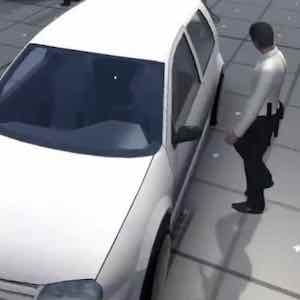 Generating 3D synthetic data to train AI algorithms for intelligent vehicle applicationsThe recognition of the vehicle’s owner or the person authorized to operate a given vehicle will be a challenge for future intelligent vehicle applications. Furthermore, the person to be recognized stands outside the car, in different and complex conditions (recognition in the “wild”): highly variable lighting, presence of other subjects, etc. Apart from the difficulty and complexity of the recognition algorithm, one of the fundamental problems becomes the data needed to train required AI models, which cannot be available yet. In this case, so-called synthetic data need to be employed. Synthetic data, generated through some simulation environments, can mimic operational conditions, by also enabling to keep edge cases into account. In fact, real-world datasets often contain imbalances, because edge cases, which do not happen frequently in real life, are not sufficiently represented. Finally, with synthetic data, other issues, e.g., related to privacy and GDPR compliance, can be easily overcome. The focus of this thesis, developed in collaboration with Centro Ricerche Fiat (CRF) and Stellantis, will be the use of computer graphics simulation (e.g., with tools like Unreal Engine's MetaHuman) or generative methods for the the production of synthetic data that could be later used to train AI algorithms for the recognition of vehicle owners that are robust to variations in terms of, e.g., illumination, presence of other human and non-human subjects, etc.The recognition of the vehicle’s owner or the person authorized to operate a given vehicle will be a challenge for future intelligent vehicle applications. Furthermore, the person to be recognized stands outside the car, in different and complex conditions (recognition in the “wild”): highly variable lighting, presence of other subjects, etc. Apart from the difficulty and complexity of the recognition ...
Generating 3D synthetic data to train AI algorithms for intelligent vehicle applicationsThe recognition of the vehicle’s owner or the person authorized to operate a given vehicle will be a challenge for future intelligent vehicle applications. Furthermore, the person to be recognized stands outside the car, in different and complex conditions (recognition in the “wild”): highly variable lighting, presence of other subjects, etc. Apart from the difficulty and complexity of the recognition algorithm, one of the fundamental problems becomes the data needed to train required AI models, which cannot be available yet. In this case, so-called synthetic data need to be employed. Synthetic data, generated through some simulation environments, can mimic operational conditions, by also enabling to keep edge cases into account. In fact, real-world datasets often contain imbalances, because edge cases, which do not happen frequently in real life, are not sufficiently represented. Finally, with synthetic data, other issues, e.g., related to privacy and GDPR compliance, can be easily overcome. The focus of this thesis, developed in collaboration with Centro Ricerche Fiat (CRF) and Stellantis, will be the use of computer graphics simulation (e.g., with tools like Unreal Engine's MetaHuman) or generative methods for the the production of synthetic data that could be later used to train AI algorithms for the recognition of vehicle owners that are robust to variations in terms of, e.g., illumination, presence of other human and non-human subjects, etc.The recognition of the vehicle’s owner or the person authorized to operate a given vehicle will be a challenge for future intelligent vehicle applications. Furthermore, the person to be recognized stands outside the car, in different and complex conditions (recognition in the “wild”): highly variable lighting, presence of other subjects, etc. Apart from the difficulty and complexity of the recognition ... - Thesis at Politecnico di Torino
 Immersive driving simulations for autonomous vehicles and road usersAutonomous vehicles are routinely advertized as the world-changing invention that will greatly impact people lives by, on the one hand, improving safety, reducing fuel consumption and decreasing urban infra-structure strains, and, on the other hand, freeing up huge amounts of time for their occupants, who will be allowed to read, consume, work, play, etc. Despite the enormous business opportunities, autonomous vehicles also come with some key issues.
Immersive driving simulations for autonomous vehicles and road usersAutonomous vehicles are routinely advertized as the world-changing invention that will greatly impact people lives by, on the one hand, improving safety, reducing fuel consumption and decreasing urban infra-structure strains, and, on the other hand, freeing up huge amounts of time for their occupants, who will be allowed to read, consume, work, play, etc. Despite the enormous business opportunities, autonomous vehicles also come with some key issues.
One of the major issues is related to the fact that, in oder to use these technology, people will first have to trust it. Besides education and experience, a factor that is regarded as the possible keystone for constructing trust towards autonomous vehicles is represented by HMI, i.e., by the paradigms chosen to communicate with the users (the vehicle occupants, but also the other road users) and to make them interact with it.
At present, since just a few vehicles are actually available for real-world experiments (and not at the highest levels of autonomy envisaged by SAE, yet) the only way to design and validate approaches for possibly coping with issues like those above is through simulation.
The VR@POLITO has developed an immersive VR driving simulation platform that has been used, e.g.,
- to explore in-vehicle interfaces based on AR Head Up Displays for enhancing drivers'/passengers' trust;
- to study pedestrians' behavior at crosswalks with incoming vehicles mounting different types of signaling interfaces;
- to investigate the effectiveness of multi-modal interfaces in urban, suburban and highway drives with autonomous vehicles.
Several thesis works are available in this field, which can address the open problems from different perspectives, possibly in collaboration with a company.
Suggested readings:
Building Trust in Autonomous Vehicles: Role of Virtual Reality Driving Simulators in HMI Design
https://arxiv.org/abs/2007.13371
Comparing State-of-the-Art and Emerging Augmented Reality Interfaces for Autonomous Vehicle-to-Pedestrian Communication
https://arxiv.org/abs/2102.02783Autonomous vehicles are routinely advertized as the world-changing invention that will greatly impact people lives by, on the one hand, improving safety, reducing fuel consumption and decreasing urban infra-structure strains, and, on the other hand, freeing up huge amounts of time for their occupants, who will be allowed to read, consume, work, play, etc. Despite the enormous business opportunities, autonomous ... - Thesis with an external company or at Politecnico di Torino
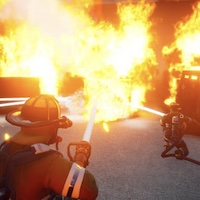 Serious games, simulation, and eXtended Reality for firefighting trainingSeveral collaborations are in place with Piedmont Region Civil Protection and Forest Firefighting Unit involved in emergency management. In this context, a number of serious games and interactive experiences leveraging Virtual Reality, Augmented Reality and Mixed Reality have been developed to support education and training of first responders, volunteers, students, etc. Three thesis proposals are available, to be developed mostly at Politecnico di Torino in collaboration with the said institutions.
Serious games, simulation, and eXtended Reality for firefighting trainingSeveral collaborations are in place with Piedmont Region Civil Protection and Forest Firefighting Unit involved in emergency management. In this context, a number of serious games and interactive experiences leveraging Virtual Reality, Augmented Reality and Mixed Reality have been developed to support education and training of first responders, volunteers, students, etc. Three thesis proposals are available, to be developed mostly at Politecnico di Torino in collaboration with the said institutions.
The objective of the first thesis is to design and implement a Virtual Reality (VR) training system tailored for firefighters specializing in aerial wildfire suppression using helicopters and Canadair aircraft. The system will leverage VR headsets and will be developed using Unity or Unreal Engine. The training system will integrate a flight simulator and a realistic fire and smoke simulator to create an immersive and effective training environment. References: https://ieeexplore.ieee.org/abstract/document/8576892, https://ieeexplore.ieee.org/abstract/document/8797889.
The second thesis proposal aims to develop a portable firefighting training system that leverages virtual reality (VR) and haptic interfaces. The system to be designed and developed should focus on training firefighters in the use of leaf blowers, a valuable tool for fire control, and backpack pumps. An adequate haptic interface should allow trainees to experience realistic jet reaction forces from the hose, enhancing their understanding of the equipment. Additionally, the system should feature accurate particle physics modeling for air and water dispersion, fire, and smoke interactions. Particular emphasis should be dedicated to the implementation of the virtual scenario, with a focus on the integration of terrains with different slopes and the creation of lifelike scenarios to effectively prepare firefighters.
The third thesis's gol is to build a multi-layer, multi-player training tool by integrating a series of previously developed interactive experiences. For instance, immersive VR-based applications for training on the use of low-flame firefighting tools or high-pressure pumping equipment have been created already. The idea would be to make it possible for decision makers to see the effects of various teams operating in such applications from a kind of centralized control room.Several collaborations are in place with Piedmont Region Civil Protection and Forest Firefighting Unit involved in emergency management. In this context, a number of serious games and interactive experiences leveraging Virtual Reality, Augmented Reality and Mixed Reality have been developed to support education and training of first responders, volunteers, students, etc. Three thesis proposals are available, to ... - Thesis at Politecnico di Torino
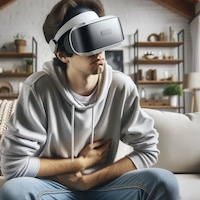 Investigating the effect of habituation on susceptibility to cybersickness in Virtual RealityCybersickness is a disorder characterized by symptoms like nausea or discomfort, that can happen meanwhile or after using Virtual Reality (VR) . Similarly to motion sickness, it is mainly caused by inconsistency between visual and aural stimuli from the simulated virtual environment and the expected feedback from the vestibular system. Several mitigation and prevention techniques have been proposed and adopted in many commercial products. However, most of them are highly situational, or require making implementation choices that can have a negative impact on core aspects such immersion, naturalness, and sense of presence.
Investigating the effect of habituation on susceptibility to cybersickness in Virtual RealityCybersickness is a disorder characterized by symptoms like nausea or discomfort, that can happen meanwhile or after using Virtual Reality (VR) . Similarly to motion sickness, it is mainly caused by inconsistency between visual and aural stimuli from the simulated virtual environment and the expected feedback from the vestibular system. Several mitigation and prevention techniques have been proposed and adopted in many commercial products. However, most of them are highly situational, or require making implementation choices that can have a negative impact on core aspects such immersion, naturalness, and sense of presence.
An approach that is still underexplored but gaining popularity among communities of users is the phenomenon of “habituation to VR”, colloquially known as “VR Legs”. It is known that repeated exposure to VR tends to reduce users' susceptibility to Cybersickness. Various VR users have reported that they have been able to develop VR Legs through repeated VR sessions of increasing duration and intensity over time. However, there is no study that has verified the existence of this phenomenon, nor are there validated guidelines that, if followed, could provide these theoretical benefits.
The objective of this thesis proposal is therefore to design a “VR Legs development” protocol, based on publicly available applications or on applications created for the purpose, which should allow a user who follows it meticulously to gain the benefits of habituation and reduce susceptibility to Cybersickness. The protocol will then be evaluated through a longitudinal user study to demonstrate its effectiveness and applicability.
References: https://xinreality.com/wiki/VR_legs.Cybersickness is a disorder characterized by symptoms like nausea or discomfort, that can happen meanwhile or after using Virtual Reality (VR) . Similarly to motion sickness, it is mainly caused by inconsistency between visual and aural stimuli from the simulated virtual environment and the expected feedback from the vestibular system. Several mitigation and prevention techniques have been proposed and adopted ... - Thesis at Politecnico di Torino
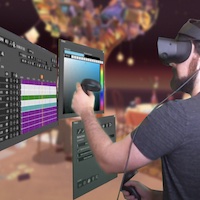 eXtended Reality technologies for Computer AnimationGenerating computer animations, particularly of virtual characters, is a very labor-intensive task, which requires animators to operate with sophisticated interfaces. Hence, researchers continuously experiment with alternative interaction paradigms that could possibly ease the above task. Among others, the use of XR represents a valid alternative to traditional interfaces (based on mouse and keyboard) since it can make interactions more expressive and intuitive. However, although the literature proposes several solutions leveraging XR to solve different computer graphics challenges, generally, these solutions are not fully integrated into the computer animation pipeline or were not designed to support collaborative working.
eXtended Reality technologies for Computer AnimationGenerating computer animations, particularly of virtual characters, is a very labor-intensive task, which requires animators to operate with sophisticated interfaces. Hence, researchers continuously experiment with alternative interaction paradigms that could possibly ease the above task. Among others, the use of XR represents a valid alternative to traditional interfaces (based on mouse and keyboard) since it can make interactions more expressive and intuitive. However, although the literature proposes several solutions leveraging XR to solve different computer graphics challenges, generally, these solutions are not fully integrated into the computer animation pipeline or were not designed to support collaborative working.
The objective of this thesis proposal is to design and develop tools integrated in Blender that allow animators to produce and edit 3D character animations, possibly considering alternative interfaces. Related works have been proposed in the literature. For example, in [1], a system was proposed by the Disney research lab to support collaborative animations through a Mixed Reality system. Additional examples for authoring contents, 3D modeling, or directing actors in virtual scenes have been proposed in [2-4]. However, according to a recent survey [5], it was not possible to identify prior initiatives that make use of XR and collaborative environments to produce computer animations. This research gap is probably due to the number of challenges that researchers have to face when approaching the design of collaborative AR/VR systems [6]. The thesis could envisage scenarios that combine VR and AR to foster collaboration among the animators.
Related works:
[1] Pan, Ye, and Kenny Mitchell (Disney Research). "PoseMMR: a collaborative mixed reality authoring tool for character animation." 2020 IEEE Conference on Virtual Reality and 3D User Interfaces Abstracts and Workshops (VRW). IEEE, 2020
[2] Nebeling, Michael, et al. "Xrdirector: A role-based collaborative immersive authoring system." Proceedings of the 2020 CHI Conference on Human Factors in Computing Systems. 2020.
[3] Larpkiattaworn, Noppasorn, et al. "Multiuser Virtual Reality for Designing and Editing 3D Models." International Conference on Human-Computer Interaction. Springer, Cham, 2020.
[4] Wang, Cheng Yao, et al. "VideoPoseVR: authoring virtual reality character animations with online videos." Proceedings of the ACM on Human-Computer Interaction 6.ISS (2022): 448-467.
[5] Schäfer, Alexander, Gerd Reis, and Didier Stricker. "A Survey on Synchronous Augmented, Virtual and Mixed Reality Remote Collaboration Systems." ACM Computing Surveys (CSUR) (2021).
[6] Krauß, Veronika, et al. "Current practices, challenges, and design implications for collaborative AR/VR application development." Proceedings of the 2021 CHI Conference on Human Factors in Computing Systems. 2021.Generating computer animations, particularly of virtual characters, is a very labor-intensive task, which requires animators to operate with sophisticated interfaces. Hence, researchers continuously experiment with alternative interaction paradigms that could possibly ease the above task. Among others, the use of XR represents a valid alternative to traditional interfaces (based on mouse and keyboard) since it ... - Thesis at Politecnico di Torino
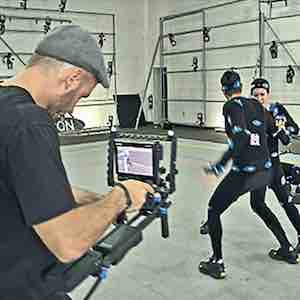 Using eXtended Reality to support the cinema industryExtended Reality (XR) technologies, encompassing both Augmented Reality (AR) and Virtual Reality (VR), are disrupting the way films are produced and viewed. Although these technologies are becoming commonplace, they are presenting new, unexplored challenges to both the actors and final viewers. For instance, when motion capture is used to record actors’ movements with the aim of animating digital characters, an increase in the workload is observed for people on stage as they have to rely largely on their imagination to understand how the digitally created characters will behave in the scene. Another research direction regards the effects of innovative cinematic techniques on the viewers' experience. For instance, a key step for immersive movies would be the selection of ideal points of view that would provide the viewer with the best user experience when watching an immersive movie.
Using eXtended Reality to support the cinema industryExtended Reality (XR) technologies, encompassing both Augmented Reality (AR) and Virtual Reality (VR), are disrupting the way films are produced and viewed. Although these technologies are becoming commonplace, they are presenting new, unexplored challenges to both the actors and final viewers. For instance, when motion capture is used to record actors’ movements with the aim of animating digital characters, an increase in the workload is observed for people on stage as they have to rely largely on their imagination to understand how the digitally created characters will behave in the scene. Another research direction regards the effects of innovative cinematic techniques on the viewers' experience. For instance, a key step for immersive movies would be the selection of ideal points of view that would provide the viewer with the best user experience when watching an immersive movie.
In this field, several theses are available. One of the main goals is to deepen existing studies in the context of cinematic AR/VR by conducting more in-depth analyses aimed at offering immersive contents more suitable to the viewers' expectations. For instance, the effects of immersive audio and lighting, as well as the posture adopted by the viewers during the experience, could be studied. Another possibility regards the improvements of an AR system designed to support the actors while rehearsing scenes containing visual effects. Specifically, new solutions are required to cope with limitations due to the combination of MoCap and AR (e.g., for correcting the point of view of the controlled character).
Suggested readings:
- Gödde M, Gabler F, Siegmund D, Braun A (2018) Cinematic narration in VR—rethinking film conventions for 360 degrees. Springer, pp 184–20
- Cannavò A; Pratticò F G; Bruno A; Lamberti F. "AR-MoCap: Using augmented reality to support motion capture acting". In: 30th IEEE Conference on Virtual Reality and 3D User Interfaces (IEEE VR 2023), Shanghai, China, March 25-29, 2023
- Cannavò A; Castiello A; Pratticò F G; Mazali T; Lamberti F. "Immersive Movies: The Effect of Point of View on Narrative Engagement". In: AI & SOCIETY. (2023)
- Yang D.; Kang J.; Kim T.; Lee S. H. "Visual Guidance for User Placement in Avatar-Mediated Telepresence between Dissimilar Spaces". In: IEEE Transactions on Visualization and Computer Graphics. (2024)
- Chung C.; Lee S. H. "Continuous Prediction of Pointing Targets with Motion and Eye-Tracking in Virtual Reality". In: IEEE Access. (2024)
- Wisessing Pisut, et al. "Enlighten Me: Importance of Brightness and Shadow for Character Emotion and Appeal.". In: ACM Transactions on Graphics. (2020)Extended Reality (XR) technologies, encompassing both Augmented Reality (AR) and Virtual Reality (VR), are disrupting the way films are produced and viewed. Although these technologies are becoming commonplace, they are presenting new, unexplored challenges to both the actors and final viewers. For instance, when motion capture is used to record actors’ movements with the aim of animating digital characters, ... - Thesis with an external company or research center
 Virtual humans and artificial intelligence in the fashion industryThe fashion industry is undergoing a digital revolution driven by recent technological improvements. Particularly in design processes and marketing strategies, new solutions have been introduced in recent years. Both market brands and researchers are increasingly investing in technologies like Virtual Fitting Rooms (VFRs) to enrich customer experiences with innovative features, such as Virtual Try-On (VTON) applications, aimed at facilitating shopping. Despite these advancements, challenges persist that could prevent customers from fully leveraging VTON solutions. These challenges include difficulties in recreating high-fidelity avatars of the users and simulating real-time clothing deformations.
Virtual humans and artificial intelligence in the fashion industryThe fashion industry is undergoing a digital revolution driven by recent technological improvements. Particularly in design processes and marketing strategies, new solutions have been introduced in recent years. Both market brands and researchers are increasingly investing in technologies like Virtual Fitting Rooms (VFRs) to enrich customer experiences with innovative features, such as Virtual Try-On (VTON) applications, aimed at facilitating shopping. Despite these advancements, challenges persist that could prevent customers from fully leveraging VTON solutions. These challenges include difficulties in recreating high-fidelity avatars of the users and simulating real-time clothing deformations.
In this field, several theses are available. One of the goals is to improve the generation of high-fidelity avatars. Specifically, the thesis requires optimizing an existing framework for the generation of avatars by exploring new solutions aimed at i) better estimating the values of the parametric model describing the avatar, ii) coping with the current limitations of existing frameworks, iii) identifying solutions for generating not only the 3D model but also the textures and fine details of the avatar. Another research direction considers the challenges related to clothes generation and animation. In this respect, the thesis would require the design of new solutions able to i) automatically reconstruct the physical properties of the materials from images and scans, and ii) generate the 3D model of the garment from the sewing patterns. Moreover, the advantages brought by the use of parametric virtual try-on and real-time cloth deformation could be studied.
Suggested readings:
- Cannavo' A.; Pesando R.; Lamberti F. A Framework for Animating Customized Avatars from Monocular Videos in Virtual Try-On Applications. In: International Conference on Extended Reality (2023).
- Gao Qiqi; Takafumi Taketomi. Garment Model Extraction from Clothed Mannequin Scan. In: Computer Graphics Forum. 2023.
- Berthouzoz Floraine, et al. Parsing sewing patterns into 3D garments. In: ACM Transactions on Graphics (TOG). (2013)
- Libao E. I.; Lee M.; Kim S.; Lee S. H. MeshGraphNetRP: Improving Generalization of GNN-based Cloth Simulation. In Proc of the 16th ACM SIGGRAPH Conference on Motion, Interaction and Games. (2023)The fashion industry is undergoing a digital revolution driven by recent technological improvements. Particularly in design processes and marketing strategies, new solutions have been introduced in recent years. Both market brands and researchers are increasingly investing in technologies like Virtual Fitting Rooms (VFRs) to enrich customer experiences with innovative features, such as Virtual Try-On (VTON) ... - Thesis at Politecnico di Torino
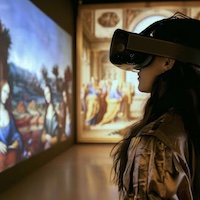 Enhancing museum accessibility for ASD users in Virtual Reality by anticipationIn the realm of social inclusion, numerous studies and applications have aimed at assisting individuals on the autism spectrum. Autistic Spectrum Disorder (ASD) encompasses a wide range of conditions that differ greatly among individuals. Some common challenges faced by those with ASD include: difficulties in social communication, such as interpreting emotions, understanding non-verbal cues, and building friendships or relationships; restricted and/or repetitive behaviors, motor movements, interests, and instances of hyperactivity; co-occurring neuro-cognitive disorders, including intellectual disabilities or specific syndromes.
Enhancing museum accessibility for ASD users in Virtual Reality by anticipationIn the realm of social inclusion, numerous studies and applications have aimed at assisting individuals on the autism spectrum. Autistic Spectrum Disorder (ASD) encompasses a wide range of conditions that differ greatly among individuals. Some common challenges faced by those with ASD include: difficulties in social communication, such as interpreting emotions, understanding non-verbal cues, and building friendships or relationships; restricted and/or repetitive behaviors, motor movements, interests, and instances of hyperactivity; co-occurring neuro-cognitive disorders, including intellectual disabilities or specific syndromes.
Research has shown that Extended Reality (XR) technologies, such as Virtual Reality (VR), can effectively support this group by enhancing social skills, education, and User eXperience (UX) in several types of environments. However, the topic of accessibility for ASD has not been explored enough when it comes to Cultural Heritage (CH) environments, such as historical buildings and museums. These environments can provide significant learning opportunities for ASD users but also present many challenges: loud or sudden noises, crowded rooms, bright or blinding lights; each of these elements can cause sensory overload, with common reactions among ASD users (repetitive movements, anxiety, panic...) or completely different reactions based on the individual user's characteristics.
This proposal aims to explore techniques and tools in a Virtual Museum (VM) environment to enhance CH accessibility for ASD users. For this purpose, the thesis will involve the creation of a VM experience that will be responsible for anticipating the physical environment in an accessible way. This investigation will possibly involve also a testing phase with ASD users.
Suggested readings:
- Diagnostic and Statistical Manual of Mental Disorders: Fifth Edition Text Revision DSM-5-TR™;
- A. Adjorlu, E. R. Høeg, L. Mangano and S. Serafin, "Daily Living Skills Training in Virtual Reality to Help Children with Autism Spectrum Disorder in a Real Shopping Scenario," 2017 IEEE International Symposium on Mixed and Augmented Reality (ISMAR-Adjunct), Nantes, France, 2017
- Moon, J., Choi, G. & Seo, J. Revisiting multimedia learning design principles in virtual reality-based learning environments for autistic individuals. Virtual Reality (2023).
- Sanku Bhavya Sri, Li Yi (Joy), Jung Sungchul, Mei Chao, He Jing (Selena), Enhancing attention in autism spectrum disorder: comparative analysis of virtual reality-based training programs using physiological data, Frontiers in Computer ScienceIn the realm of social inclusion, numerous studies and applications have aimed at assisting individuals on the autism spectrum. Autistic Spectrum Disorder (ASD) encompasses a wide range of conditions that differ greatly among individuals. Some common challenges faced by those with ASD include: difficulties in social communication, such as interpreting emotions, understanding non-verbal cues, and building ... - Thesis at Politecnico di Torino
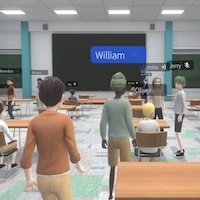 The future of education: Evaluating Metaverse platforms for virtual learning experiences“Metaverse” is a term that refers to immersive virtual universe, generally accessible through eXtended Realty devices. Although the main purpose of this universe is socialization, recent efforts are starting to focus on the creation of experiences for education and training. Currently, several metaverse platforms, each with unique features and limitations, can be used for creating these experiences.
The future of education: Evaluating Metaverse platforms for virtual learning experiences“Metaverse” is a term that refers to immersive virtual universe, generally accessible through eXtended Realty devices. Although the main purpose of this universe is socialization, recent efforts are starting to focus on the creation of experiences for education and training. Currently, several metaverse platforms, each with unique features and limitations, can be used for creating these experiences.
The objective of this thesis is to explore the functionalities of the existing platforms, with the aim to evaluate their intrinsic characteristics, their advantages and disadvantages with respect to the domain of interest, and, ultimately, which ones are the most suitable for the realization of learning experiences. To conduct this evaluation, it will be necessary to create basic learning tasks within the considered metaverse platforms.
Among the best-known platforms that can, in principle, support the creation of such tasks it is possible to mention VRChat, Decentraland, Roblox, Horizon Worlds, RecRoom, The Sandbox, Sansar, etc. Some platforms stand out because they are based on the Blockchain, others for their marked social nature or for the possibility they offer to create highly personalized experiences (from simple modifications to avatars and other assets provided, up to the management of more complex aspects such as physics simulation). Each of these characteristics can be suitable for the creation of learning experiences, depending on the pedagogical needs and the tackled context.“Metaverse” is a term that refers to immersive virtual universe, generally accessible through eXtended Realty devices. Although the main purpose of this universe is socialization, recent efforts are starting to focus on the creation of experiences for education and training. Currently, several metaverse platforms, each with unique features and limitations, can be used for creating these experiences. ... - Thesis at Politecnico di Torino
 Enhancing non-verbal communication in Social VR environments through body movement mimicryTechnological advances have significantly changed the way individuals communicate, bridging geographical divides and fostering connections across platforms such as smartphones, social networks and virtual reality (VR). In particular, the emergence of VR technology has responded to the desire for more engaging online interactions, paving the way for social VR platforms. These platforms allow users to create custom avatars and interact with old and new friends in customized virtual environments. Despite the immersive nature of Social VR, there remains a significant gap in non-verbal communication, which is a crucial element in the perspective user experience. In fact, research suggests that non-verbal signals play a vital role in making interactions more engaging and realistic.
Enhancing non-verbal communication in Social VR environments through body movement mimicryTechnological advances have significantly changed the way individuals communicate, bridging geographical divides and fostering connections across platforms such as smartphones, social networks and virtual reality (VR). In particular, the emergence of VR technology has responded to the desire for more engaging online interactions, paving the way for social VR platforms. These platforms allow users to create custom avatars and interact with old and new friends in customized virtual environments. Despite the immersive nature of Social VR, there remains a significant gap in non-verbal communication, which is a crucial element in the perspective user experience. In fact, research suggests that non-verbal signals play a vital role in making interactions more engaging and realistic.
Therefore, addressing this gap is key to further enhancing user immersion and presence. In particular, “mimicry”, i.e. the unconscious imitation of communicative patterns, movements and expressions, is a fundamental element of non-verbal communication that has been scarcely explored so far in the context of Social VR. The aim of this thesis is to design, develop and subsequently evaluate through user tests a mimicry algorithm of body movements to improve empathy and socialisation between individuals in a virtual environment. The starting point for the thesis will be a previous work carried out by the GRAINS group on facial mimicry.Technological advances have significantly changed the way individuals communicate, bridging geographical divides and fostering connections across platforms such as smartphones, social networks and virtual reality (VR). In particular, the emergence of VR technology has responded to the desire for more engaging online interactions, paving the way for social VR platforms. These platforms allow users to create ... - Thesis at Politecnico di Torino
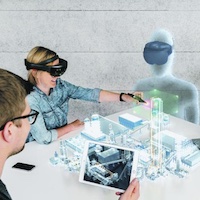 eXtended Reality, interaction metaphors and gamification elements for co-located, collaborative design taskseXtended Reality (XR) technologies, including Virtual reality (VR), Augmented Reality (AR), and Mixed Reality (MR), offer new opportunities for collaboration and communication among users in virtual and hybrid contexts. Specifically, the use of XR in co-located design tasks, where multiple users need to collaborate in real-time and share ideas, opens new horizons for improving the efficiency and creativity of group work. This thesis aims, on the one hand, to compare and evaluate different types of XR technologies (VR, AR, MR) in the context of co-located design tasks, where users need to communicate and show their ideas to each other and, on the other hand, to identify and develop techniques, metaphors, and gamification elements that optimize the use of XR in these contexts, providing cues, information, actions, and mechanics that would not be possible without the use of XR. The thesis aims to offer an in-depth understanding of how XR technologies can be optimally used to facilitate collaborative design tasks, improving the quality of group work and communication among participants. The results will contribute to outlining future applications and developments of XR technologies in collaborative contexts.
eXtended Reality, interaction metaphors and gamification elements for co-located, collaborative design taskseXtended Reality (XR) technologies, including Virtual reality (VR), Augmented Reality (AR), and Mixed Reality (MR), offer new opportunities for collaboration and communication among users in virtual and hybrid contexts. Specifically, the use of XR in co-located design tasks, where multiple users need to collaborate in real-time and share ideas, opens new horizons for improving the efficiency and creativity of group work. This thesis aims, on the one hand, to compare and evaluate different types of XR technologies (VR, AR, MR) in the context of co-located design tasks, where users need to communicate and show their ideas to each other and, on the other hand, to identify and develop techniques, metaphors, and gamification elements that optimize the use of XR in these contexts, providing cues, information, actions, and mechanics that would not be possible without the use of XR. The thesis aims to offer an in-depth understanding of how XR technologies can be optimally used to facilitate collaborative design tasks, improving the quality of group work and communication among participants. The results will contribute to outlining future applications and developments of XR technologies in collaborative contexts.
References:
- CIDER: Collaborative Interior Design in Extended Reality
https://dl.acm.org/doi/abs/10.1145/3605390.3605419
- ARID—An Augmented Reality Mobile Application for Interior Design
https://link.springer.com/chapter/10.1007/978-3-031-20182-0_1
- Studying gesture-based interaction on a mobile augmented reality application for co-design activity
https://link.springer.com/article/10.1007/s12193-017-0252-0#Sec1
- Cues to fast-forward collaboration: A Survey of Workspace Awareness and Visual Cues in XR Collaborative Systems
https://onlinelibrary.wiley.com/doi/full/10.1111/cgf.15066
- What And How Together: A Taxonomy On 30 Years of Collaborative Human-Centered XR Tasks
https://ieeexplore.ieee.org/stamp/stamp.jsp?tp=&arnumber=10316494eXtended Reality (XR) technologies, including Virtual reality (VR), Augmented Reality (AR), and Mixed Reality (MR), offer new opportunities for collaboration and communication among users in virtual and hybrid contexts. Specifically, the use of XR in co-located design tasks, where multiple users need to collaborate in real-time and share ideas, opens new horizons for improving the efficiency and creativity of ... - Thesis at Politecnico di Torino
 Using Large Language Models to support hands-free locomotion in Virtual RealityThe fusion of Large Language Models (LLMs) with Virtual Reality (VR) holds promise for a significant evolution in user experience. Within this context, exploring the utilization of LLMs for a hands-free locomotion system becomes particularly intriguing. This thesis aims to leverage the advanced natural language processing capabilities of these models to interpret user commands for teleportation, thus enhancing user interaction and immersion by allowing seamless and intuitive navigation without the need for physical controllers.
Using Large Language Models to support hands-free locomotion in Virtual RealityThe fusion of Large Language Models (LLMs) with Virtual Reality (VR) holds promise for a significant evolution in user experience. Within this context, exploring the utilization of LLMs for a hands-free locomotion system becomes particularly intriguing. This thesis aims to leverage the advanced natural language processing capabilities of these models to interpret user commands for teleportation, thus enhancing user interaction and immersion by allowing seamless and intuitive navigation without the need for physical controllers.
The primary objective will be to design and implement a framework that integrates LLMs for hands-free teleportation in VR environments. The activities will start with the design of the framework, defining a comprehensive set of teleportation commands and establishing the architecture for integrating LLMs with Unity. The implementation phase will involve developing a prototype, utilizing LLMs to interpret spoken commands and control VR teleportation. The system's effectiveness will be evaluated through user studies, collecting both quantitative and qualitative data to measure accuracy, response times, and overall user experience.
References:
- D. Calandra, F. G. Pratticò, and F. Lamberti, "Comparison of Hands-Free Speech-Based Navigation Techniques for Virtual Reality Training," in 2022 IEEE 21st Mediterranean Electrotechnical Conference (MELECON), Palermo, Italy, 2022, pp. 85-90. doi: 10.1109/MELECON53508.2022.9842994.
- J. A. V. Fernandez, J. J. Lee, S. A. S. Vacca, A. Magana, B. Benes, and V. Popescu, "Hands-Free VR," arXiv preprint arXiv:2402.15083, 2024The fusion of Large Language Models (LLMs) with Virtual Reality (VR) holds promise for a significant evolution in user experience. Within this context, exploring the utilization of LLMs for a hands-free locomotion system becomes particularly intriguing. This thesis aims to leverage the advanced natural language processing capabilities of these models to interpret user commands for teleportation, thus enhancing ... - Thesis at Politecnico di Torino
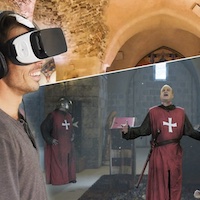 Experiencing past events through an eXtended Reality application for the MetaverseExtended reality applications are getting commonplace in several domains, ranging from entertainment to education. Moreover, the increasing interest in the Metaverse is attracting, more and more, the attention of researchers and companies. In the Metaverse, different communities can meet each other, with the aim of exchanging their idea or knowledge and working together on a given project. But what happens if a user has not the possibility to participate in an online event, or the people he or she is looking for lived in the previous century?
Experiencing past events through an eXtended Reality application for the MetaverseExtended reality applications are getting commonplace in several domains, ranging from entertainment to education. Moreover, the increasing interest in the Metaverse is attracting, more and more, the attention of researchers and companies. In the Metaverse, different communities can meet each other, with the aim of exchanging their idea or knowledge and working together on a given project. But what happens if a user has not the possibility to participate in an online event, or the people he or she is looking for lived in the previous century?
The aim of this thesis is to provide users the possibility to experience seamless physical interactions or events even if they happened in the past. In this way, when a user is unable to participate in a given interaction or event, the system will be able to capture co-located or remote physical events in real-time, recognize and constructs a list of events (possibly dependent on each other), and allow immersed users to revisit them at a suitable time. Intelligent systems could be leveraged to make alive famous people or reconstruct historical events, with the aim of making them available in the Metaverse. This capability of a system to reconstruct events and interactions is usually referred to as Asynchronous Reality. The system will also allow users to transition along the reality-virtuality continuum and collaborate with users experiencing the same application through different technologies. In this way, the benefits of both virtual and augmented reality can be leveraged in the same application, e.g., for developing problem-solving skills, proposing and validating new interaction paradigms. Developing such kind of asynchronous- and cross-reality systems is usually characterized by numerous challenges (addressed in this thesis). The outcomes of this research would be applied to a number of use cases, such as virtual prototyping, training, enabling user-to-user or user-to-machine/robot collaborations in scenarios regarding, e.g., education, industry, healthcare, cultural heritage, etc.
Suggested readings:
- Gruenefeld, Uwe, et al. "VRception: Rapid Prototyping of Cross-Reality Systems in Virtual Reality." CHI Conference on Human Factors in Computing Systems. 2022.
- Wang, Nanjia, and Frank Maurer. "A Design Space for Single-User Cross-Reality Applications." Proceedings of the 2022 International Conference on Advanced Visual Interfaces. 2022.
- Kikuchi, Yusuke, et al. "Mobile Cross Reality (XR) Space for Remote Collaboration." Human Factors in Virtual Environments and Game Design 50 (2022).
- Woodworth, Jason W., David Broussard, and Christoph W. Borst. "Redirecting Desktop Interface Input to Animate Cross-Reality Avatars." 2022 IEEE Conference on Virtual Reality and 3D User Interfaces (VR). IEEE, 2022.
- Fender, Andreas Rene, and Christian Holz. "Causality-preserving asynchronous reality." Proceedings of the 2022 CHI Conference on Human Factors in Computing Systems. 2022.Extended reality applications are getting commonplace in several domains, ranging from entertainment to education. Moreover, the increasing interest in the Metaverse is attracting, more and more, the attention of researchers and companies. In the Metaverse, different communities can meet each other, with the aim of exchanging their idea or knowledge and working together on a given project. But what happens if a ...
